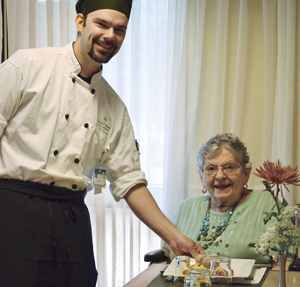By ELLEN FUTTERMAN
Until a year or so ago, mealtime for 91-year-old Edna Wagner typically consisted of different colored globs on a plate.
Wagner has difficulty swallowing, and so all her food must be pureed. But the result was often unappealing to the eye, and it didn't taste good either.

Sean McNally, executive chef at Sanctuary at Bellbrook, serves Edna Wagner a plate of pureed and reconstructed spaghetti and meatballs.
Today, however, Wagner looks forward to sitting down to eat with other residents at Sanctuary at Bellbrook, a faith-based continuing care retirement community in Rochester Hills, Mich. That's largely because her meals now look, taste and smell like everyone else's, although they are still pureed.
"The presentation, and the taste, are a lot better," said Wagner, adding that veal is her favorite dish.
Thanks to Puree with a Purpose, an innovative culinary program implemented by Trinity Senior Living Communities and their food supplier Unidine, Wagner's pureed food is difficult to distinguish from the non-pureed food enjoyed by other residents. Unidine is a food management company for hospitals and senior facilities based in Boston. Trinity Senior Living Communities, part of CHE Trinity Health, has 37 senior communities in six states, including Sanctuary at Bellbrook.
"We have a need with our population to have pureed food, but frankly, for a long time, it wasn't something we were doing well," said Kelly Gasior, Trinity Senior Living Communities' vice president, strategy and housing operations. She explained that some of the culinary staff were bothered by "the sloppy, non-dignified puree program" that had been in place.
Turning the cooks loose
"They felt it went against our mission to provide a dignified healing environment," added Larry D'Andrea, director of dining services at Sanctuary at Bellbrook. So these cooks started experimenting with ways to present pureed food more attractively and make it taste better.
"We feel good that we empower our staff to make the changes they know need to happen right now," said Gasior. Unidine became a partner, she added, "to make sure our approach was consistent across the board. We wanted to develop a program and make sure it could be obtained at every (Trinity) community." Puree with a Purpose is in all Trinity's long-term care and assisted living facilities and the system hopes to expand it to its independent senior living communities.
Adam Snyder, regional vice president of operations for Unidine, said it took between a year and 15 months "from inception to training to perfect" the Puree with a Purpose program. "Prior to the program, there were a few different approaches to puree, like buying something completely different than what was on the menu, defrosting it and then popping it in the steamer or using food scraps or leftovers and pureeing that.
"But unfortunately," Snyder continued, "often it wasn't the same thing being served to the other residents. It might be a poultry item, but it wasn't the same chicken. We really wanted the (pureed) food not only to look as close as possible to the entrée being served to other residents, but to be the exact same items so it tastes exactly alike."
Sean McNally, the executive chef at Sanctuary at Bellbrook, trained at a Michigan culinary school. He said it takes minutes for his staff to "puree and pipe" everything from spaghetti and meatballs to tilapia to chicken breasts. Industrial grade food processors deconstruct the food, which sometimes requires various thickening agents to get it to the right consistency. Then it's reshaped with molds, piping bags or other devices to look like its original form.
"With pureed spaghetti, for example, we put it through a potato ricer and it comes out in beautiful, long strands," said McNally. "We even have a way to get grill marks into our grilled sandwiches."
Butter and cream
Both McNally and Snyder said that while most any food can be pureed, items with seeds are tricky. McNally said desserts are especially easy to do, and often taste better than their non-pureed counterparts "because we add heavy cream and butter to thicken, and they just taste amazing."
Those ingredients also add calories, which is another goal of the program, since many people on pureed diets tend to lose weight when they shouldn't. Gasior said that since Puree with a Purpose has been in place, unintended weight loss has decreased from nearly 4 percent to 1.1 percent and dietary supplement costs have been reduced to $69,528 from $123,969.
Puree with a Purpose is "budget neutral," said Unidine's Snyder, because chefs are pureeing the same items they are preparing. "Maybe there was $100 to $200 start-up costs per senior community for piping bags and tips, ricers and some other equipment," he said, "but it wasn't a major investment."
Gasior said Puree with a Purpose is being expanded to include residents with eating issues besides swallowing disorders, such as ill-fitting dentures and gastrointestinal problems.
In addition, Trinity and Unidine introduced a program last fall called Fresh Benefits, which will replace liquid nutrition supplements with homemade shakes loaded with fresh ingredients.
"Nothing is more institutional than a bottle of Ensure," said Snyder. "We're trying to bring a fresh approach to supplements by creating a nutritious smoothie." He expects the program to save money, increase resident satisfaction and decrease weight loss because more nutrition and calories will be added to the shakes.
"The program exemplifies what our best practices are," Gasior said. "It was started from within by members of a staff who cares. It helps on our dignity mission, ethics, resident care, satisfaction, weight-loss turnaround — it hits all of our hot spots."
Copyright © 2014 by the Catholic Health Association
of the United States
For reprint permission, contact Betty Crosby
or call (314) 253-3477.